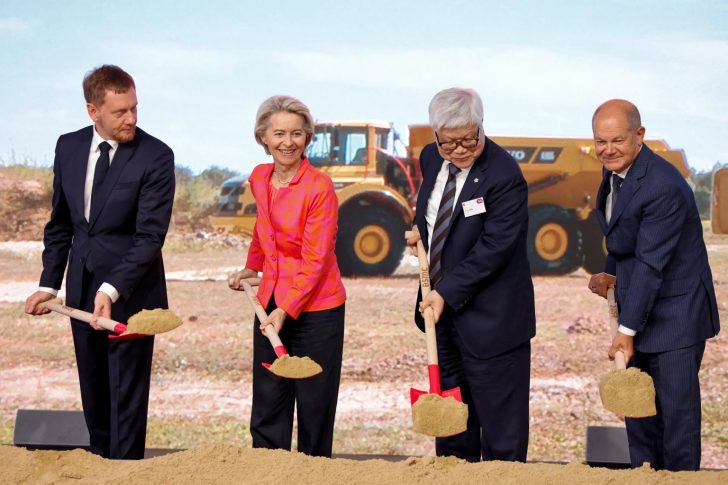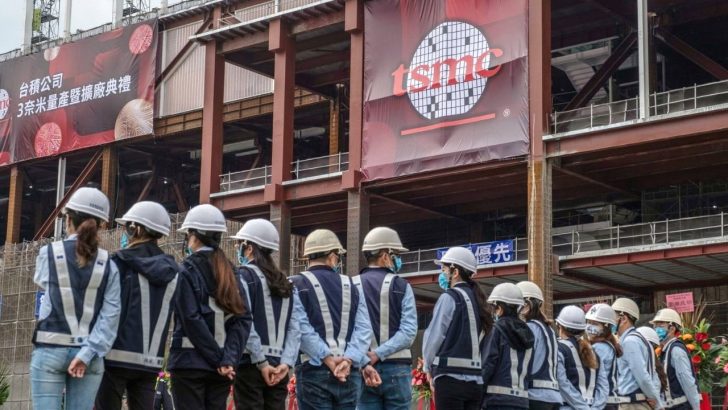In a historic move amid growing China-Taiwan tensions, Taiwan Semiconductor Manufacturing Company (TSMC) has broken ground on its first-ever European plant in Dresden, Germany. The groundbreaking ceremony of the new TSMC factory took place on August 20, 2024. It marks a significant milestone for both TSMC and the European semiconductor industry.
The event was attended by key figures such as European Commission President Ursula von der Leyen, TSMC CEO C.C. Wei, and German Chancellor Olaf Scholz. This new TSMC factory not only represents a substantial investment in Europe's technological future. But it also highlights the geopolitical complexities surrounding Taiwan's semiconductor dominance.
The Importance of the New TSMC Factory in Dresden, Germany
The decision to establish a TSMC factory in Germany is a strategic move that speaks volumes about the current global landscape. With an investment of approximately 3.5 billion euros ($3.9 billion), TSMC is set to own 70% of the capital in the Dresden project.
The remaining 30% will be shared among European partners. These include Dutch chipmaker NXP, Germany's Infineon, and Bosch, each holding 10%.

Fortune / Industry leaders like the European Commission President Ursua von der Leyen, TSMC CEO C.C. Wei, and German Chancellor Olaf Scheloz attended the groundbreaking ceremony of the Taiwanese chipmaker on Tuesday.
However, the location of the TSMC factory in Dresden is no coincidence. Dresden, often referred to as "Silicon Saxony," is already a hub for semiconductor manufacturing in Europe. By choosing this site, TSMC is tapping into an existing ecosystem of expertise, infrastructure, and supply chains. The presence of a TSMC factory in Europe will likely catalyze further growth in the region's semiconductor industry. It will create jobs, boost innovation, and ensure a more resilient supply chain.
It is Happening Amid China-Taiwan Tensions!
On a side note, the backdrop to TSMC's expansion into Europe is the escalating tension between China and Taiwan. As Taiwan's leading semiconductor company, TSMC plays a critical role in the global supply chain. However, the company's reliance on a single region - Taiwan - makes it vulnerable to geopolitical shocks.
China, which views Taiwan as part of its territory, has ramped up its rhetoric about "unification." Thus, raising concerns about the stability of the semiconductor supply chain.
However, the involvement of European companies like NXP, Infineon, and Bosch in the TSMC factory further strengthens the continent's semiconductor ecosystem. This partnership not only brings cutting-edge technology to Europe but also fosters collaboration between leading players in the industry.

GTN / With the TSMC factory at the heart of this ecosystem, Europe is poised to reduce its dependence on semiconductor imports from Asia and the United States. Thus, enhancing its economic security and technological sovereignty.
The Broader Implications of the In-Progress TSMC Factory
The establishment of the TSMC factory in Germany has far-reaching implications beyond Europe. It signals a shift in the global semiconductor landscape, as companies and governments alike recognize the need for more geographically diverse supply chains.
Similarly, the move is also a testament to the growing importance of semiconductors in driving economic growth, innovation, and national security.
For Europe, the novel TSMC factory is a major victory. It reinforces the continent's commitment to becoming a leader in advanced technologies and demonstrates its ability to attract significant foreign investment. The presence of TSMC in Europe will likely encourage other semiconductor companies to follow suit, further solidifying Europe's role in the global technology landscape.











